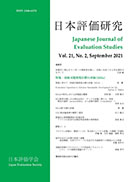Volume 21, Issue 2
Displaying 1-11 of 11 articles from this issue
- |<
- <
- 1
- >
- >|
Preface
-
2021Volume 21Issue 2 Pages 1-2
Published: September 30, 2021
Released on J-STAGE: June 01, 2023
Download PDF (304K)
Special Issue: Issue on Evaluating the SDGs
-
2021Volume 21Issue 2 Pages 3-4
Published: September 30, 2021
Released on J-STAGE: June 01, 2023
Download PDF (300K) -
2021Volume 21Issue 2 Pages 5-18
Published: September 30, 2021
Released on J-STAGE: June 01, 2023
Download PDF (558K) -
2021Volume 21Issue 2 Pages 19-30
Published: September 30, 2021
Released on J-STAGE: June 01, 2023
Download PDF (1270K) -
2021Volume 21Issue 2 Pages 31-46
Published: September 30, 2021
Released on J-STAGE: June 01, 2023
Download PDF (1826K) -
2021Volume 21Issue 2 Pages 47-62
Published: September 30, 2021
Released on J-STAGE: June 01, 2023
Download PDF (1876K) -
2021Volume 21Issue 2 Pages 63-71
Published: September 30, 2021
Released on J-STAGE: June 01, 2023
Download PDF (1332K) -
2021Volume 21Issue 2 Pages 73-87
Published: September 30, 2021
Released on J-STAGE: June 01, 2023
Download PDF (1776K)
Research Note
-
2021Volume 21Issue 2 Pages 89-101
Published: September 30, 2021
Released on J-STAGE: June 01, 2023
Download PDF (1411K) -
2021Volume 21Issue 2 Pages 103-116
Published: September 30, 2021
Released on J-STAGE: June 01, 2023
Download PDF (1693K) -
2021Volume 21Issue 2 Pages 117-130
Published: September 30, 2021
Released on J-STAGE: June 01, 2023
Download PDF (1604K)
- |<
- <
- 1
- >
- >|
